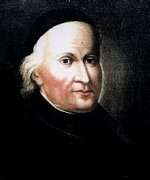Tadeusz Brzozowski

Very Rev. Tadeusz Brzozowski, S.J. (October 21, 1749 – February 5, 1820) was a Polish Jesuit, elected 19th Superior General of the Society of Jesus.
Birth
Brzozowski was born in Königsberg, East Prussia, (Kaliningrad, Russia) on October 21, 1749, of parents of Polish descent.
Career
Brzozowski entered the Jesuit order in 1765, and studied Rhetoric, Greek, French and classical literature in Slutsk (Belarus)(1767–70) followed by Philosophy and Mathematics in Nesviz (1770–73).
Suppression of the Society
After the Suppression of the Society of Jesus (1773) he continued his Theological studies in Vilnius, Vilna Governorate, Russian Empire (Vilnius, Lithuania), where he was ordained priest in 1775.
Return to the Jesuits in Russia
In 1782 he left for Polatsk, in the Russian Empire, (Polotsk, Belarus) in order to be readmitted among the Jesuits. A gifted linguist (knowing Latin, French, German, Russian) he translated theological works in his native Polish. He was also a successful and well known preacher. In 1797 he was named Secretary of the Society and worked closely with Gabriel Lenkiewicz, Franciszek Kareu and Gabriel Gruber, the successive Vicars General of the Society in Russia. On their behalf he was keeping correspondence with the many ex-jesuits who wanted to rejoin the Order. At the Regional Congregation of 1802 he was made Assistant of the newly elected Superior General of the Jesuits in Russia, Gabriel Gruber.
Superior General
At the death of Gruber, in 1805, the Regional (Polish) Congregation IV met at Polatsk, at this point part of the Grand Duchy of Lithuania (Polotsk, Belarus) and elected Tadeusz Brzozowski as Superior General of the Society in Russia. The new elected General immediately sent a message to Pope Pius VI thanking him for having restored the Society in Sicily. By then a steady stream of young men was coming to Russia to join the Society. Between 1803 and 1805, 103 candidates entered the novitiate of Polatsk, 23 among them being priests. The total number of Jesuits was 333, mostly engaged in educational activities (7 high schools in Russia only) but moving also into pastoral work in Latvia and Lithuania. It seemed clear that the suppression would eventually be undone. in 1812 Polatsk was upgraded by Tsar Alexander I into a university academy, allowing thus affiliation of all the Jesuit schools and protecting them from undue local interference.
In October 1806, the ex-jesuits of Maryland were fully incorporated into the Society and Brzozowski allowed an American novitiate with ten novices to be opened at Georgetown. Later that year, Bishop Joseph-Octave Plessis of Québec wrote to Pius VII and to Brzozowski, begging that Jesuits be sent from Great Britain not only for Halifax but to work among the aboriginal people in Upper Canada as well. Brzozowski sent four men—two from Russia and two from England—but the war in Europe and the dangers of travel made their mission impossible.
On the other hand, there were growing internal tensions as the foreign Jesuits, not conversant with the political situation of the empire, were criticizing Brzozowski for certain decisions taken that, they felt, were too liberal (such as allowing the Orthodox faith to be taught in Jesuit schools).
Restoration of the Society
Brzozoswki worked tirelessly to obtain the universal restoration of the Society, personally and through his delegate in Rome, Fr Luigi Fortis SJ. This is one of the first things Pope Pius VII did after returning from Napoleonic exile to Rome. On August 7, 1814, almost exactly forty-one years to the day since Clement XIV suppressed the Society, Pius VII celebrated mass in the Church of the Gesú, and formally promulgated the bull of restoration, Sollicitudo omnium ecclesiarum. The newly reconstituted Jesuits deemed a general congregation unnecessary: Brzozowski retained the title and became Superior General of the Society of Jesus in the full sense. As a result of Czar Alexander I of Russia prohibiting Brzozowski from leaving Russia, he appointed Fr Luigi Fortis SJ, as his representative in Rome from 1814 to 1819, when Brzozowski died. Brzozowski was the link which bound the two parts of the Society together.
Political complications
The restoration came at a time when Russia was experiencing a strong nationalist movement, calling, among other things for a strengthening of the Orthodox Church. The Jesuits were seen as an obstacle to that. Alarmed at the new growth of the Jesuits, Alexander published an edict on December 20, 1815 expelling them from St. Petersburg and taking over their High School on the ground that the Jesuits were using it to convert Russian nobles to Catholicism. Brzozowski was detained and forbidden to return to Rome, despite his ailing health and his protests. Sensing that the days of the Society in Russia were numbered Brzozowski sent several Jesuits to a number of countries in Western Europe to speed up the reestablishment of the order.
Death
Brzozowski died on February 5, 1820 and was buried in Polatsk, Belarus. However, to make sure that the Congregation that would elect his successor would meet in Rome he had nominated an Italian, Mariano Petrucci, as his Vicar General. The 13 March 1820, the Jesuits were expelled from Russia.
References
- INGLOT, M., La Compagnia di Gesù nell'impero Russo (1772-1820), Rome, 1997.
- ROUET de JOURNEL, M.-J., La Compagnie de Jésus en Russie; un collège jésuite à Saint Petersbourg (1800-1816), Paris, 1922.
- ZALENSKI, S., Les Jésuites de la Russie blanche (2 vol.), Paris, 1886.
| Wikisource has the text of the 1911 Encyclopædia Britannica article Brzozowski, Thaddeus. |
| Preceded by Gabriel Gruber |
Superior General of the Society of Jesus In Exile (Russia) 1805–1814 |
Succeeded by restoration |
| Preceded by suppression |
Superior General of the Society of Jesus 1814 – 1820 |
Succeeded by Luigi Fortis |